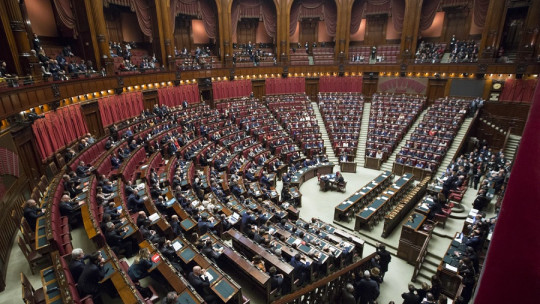
It is evident that politics is a fundamental part of our society and therefore of the lives of all individuals.
Therefore, It is not surprising that phenomena linked to politics have important psychological implications for people, some of them of a positive nature but others quite negative. Through the following paragraphs we will learn more about some of the most important ones.
How politics affects us psychologically: its main repercussions
Aristotle said that the human being was a “zoon politikon”, which in Greek means political animal (which comes from polis, city) or civil animal. What is meant by this expression is that man is a social being, an animal that is evolutionarily accustomed to living in society. Therefore, it is inevitable that politics arises, which literally means of the citizens, or also of the State, and is therefore the art of relating between all the members of a society.
The anthropologist Elman R. Service proposed the classification of all human societies into four levels, according to its complexity and structure. According to this criterion, we could talk about bands, tribes, chiefdoms and states. Politics appears, to a greater or lesser extent, in all of them, but as we advance through these stages, they consequently become more intricate, until we reach the political organization of modern States, where politics itself is more than an art, it is a science, in which all variables are controlled.
Although not all people are politicians, in the sense of making a living from this profession, yes, They are all affected by politics itself and by the decisions of politicians from different administrations where they live or work. Therefore, it is assumed that this will have repercussions on a psychological level, which will be more or less pronounced depending on a series of characteristics, both of the person themselves, as well as the conditions of the environment and the politicians themselves.
The first factor that will determine how politics affects us psychologically will be the degree of involvement that the individual has regarding it It is obvious that there are people much more interested in the political panorama than others, and therefore, for the former the effects will be much more pronounced, since for these people politics occupies a central place in their lives and therefore they live every event. that has to do with this topic with great intensity.
Also The degree of impact that the political decision in question has on that individual will be decisive specific. In this sense, if it is a measure that directly affects your way of life in any of its facets, it is more likely that there will be a psychological reaction to it, whether for or against. On the contrary, if the person believes that this legislative change is irrelevant to their daily life, it may not generate any type of emotion, neither positive nor negative.
In order to delve deeper into the specific consequences of how politics affects us psychologically, we are going to take a look at the positive effects and then the negative ones.
positive effects
The first option is that political activity is a positive factor. This can happen, as we have seen, because it generates a positive change for your daily life. In that sense, the simple perception that the rulers take care of their problems implies satisfaction and a positive state of mind that, psychologically, is pleasant and beneficial for the individual. If, in addition, this political decision is made by a party in accordance with its ideology, the effect will be even more enhanced.
Furthermore, those who live politics with a certain intensity They will attend the electoral processes as if it were a sporting event and they will experience the victories of their political party as a Real Madrid or Barcelona fan experiences the conquest of a Champions League, as if Rafa Nadal lifted another Roland Garros or Fernando Alonso won a Formula 1 Grand Prix. There are many parallels between the monitoring of sporting activity and politics, and what is experienced with victories in both areas.
When our favorite political party wins, we secrete a series of neurotransmitters that make us experience a feeling of happiness that floods us and keeps us in a state of euphoria. But this mechanism works exactly the same in the opposite direction. And, logically, where some celebrate a victory, there are inevitably others who suffer defeat. But that question belongs to the next point, that of how politics affects us psychologically, this time on a negative level.
Negative effects
But, just as politics can generate positive aspects in people’s lives, it is also true that can have much more unpleasant consequences at all levels, among them, the psychological one. To begin with, people very involved in the political life of their country run the risk of becoming immersed in a spiral of monitoring activity and even activism in favor of one party or another that can become really exhausting.
An excessive involvement in political affairs can cause an increase in anxious and/or depressive symptoms with the added problem that politics usually occupies the bulk of the thoughts of the person in question on a daily basis, causing the topic to be constantly on their mind, making them resort to conversations about this topic frequently and this also makes them It marks the beginning of heated debates that soon turn into arguments.
In fact, one of the biggest problems that we find in the question of how politics affects us psychologically is the feeling of rivalry that is generated between the different factions of thought, and that are constantly watered with gasoline by the leaders of the different parties, knowing that these arson attacks are convenient for them to keep their followers focused on the ideological struggle and ready to silence opposing positions with their arguments.
This state of constant activation is emotionally draining, generating, as we have already mentioned, symptoms compatible with anxiety and depression, and great irritability that can trigger mood swings and frequent arguments, sometimes even with loved ones, as a result of issues that are actually foreign to them, at least to a large extent. It would be a situation very similar to what happens with big sports fans, as we have already seen, and this extends to rivalry between fans.
Social networks
Continuing along the line of negative effects, we cannot fail to point out the important factor that the media and especially social networks represent in the generation and maintenance of this state of hyperactivation and that explains how politics affects us psychologically. largely. And the fact is that, today, we are subjected to a constant bombardment of information, much of it politicized in one direction or another, and it is almost impossible to abstract ourselves from all of it and not suffer any of its effects.
Social networks like Facebook, Twitter or even WhatsApp have a lot to do with how politics affects us psychologically because sometimes entering any of these applications means exposing ourselves to a whole string of comments, opinions, appeals or diatribes, sometimes from strangers, but many other times from people we know and even very close to, who have become authentic cyber- activists and who dedicate much of their time to trying to spread their political thoughts.
When the same thing happens to the reader and he is also a follower of the same or similar tendencies, there is usually no problem, since it will simply reaffirm his positions, but if he is equally aggressive in his approaches, but with different political thoughts, the discussion is served. , and with it the different negative psychological effects on both parties, who more than likely will not give in and will engage in an eternal discussion that will lead nowhere.
The third option is that the reader is unrelated to politics, and that the river of political comments appearing on the wall of your favorite social network is nothing more than an annoyance when scrolling in search of other content, since it will repeatedly ignore these types of messages, even if they come from close people or even family members. In fact, many times people choose to silence these individuals, since removing them from the friends list would, once again, be a cause for conflict.








